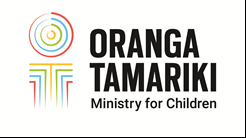
IN-CONFIDENCE
OIA-CE-2024-02684
11 December 2024
Nic Lane
FYI website
[FYI request #29178 email]
Tēnā koe Nic
Thank you for your email, received on 13 November 2024, to Oranga Tamariki—
Ministry for Children (Oranga Tamariki) requesting information on the Complaints
Process Approachability at Oranga Tamariki. Your request has been considered under
the Official Information Act 1982 (the Act).
I have addressed each of your questions below:
1.
An outline of the complaints process, including step-by-step details on how
individuals can lodge a complaint and any flow charts to understand this
process.
The Oranga Tamariki website outlines the complaint process and how individuals can
lodge a complaint which you can find
here. Oranga Tamariki also has leaflets at sites
that people can access which provide a feedback form that can be detached and
handed in or posted to us. As such, your request is refused under section 18(d) of the
Act as the information requested is publicly available.
2.
Alternative Format Availability (information on the availability of alternative
formats e.g. Easy Read, BRF, Oral) for complaints documentation and
resources.
Oranga Tamariki has an alternative page and web form on the Oranga Tamariki
website for tamariki and rangatahi which can be found
here.
3.
Information on the languages supported within the complaints process,
including te Reo Māori, New Zealand Sign Language, and any other
languages available. This should include details of any written, spoken, or
digital resources available in these languages to assist complaints through
the process. Any specific strategies or initiatives to support complaints
whose first language is not English.
Oranga Tamariki follows the Government Web Standards to make sure that our
content is available to everyone, including people with disabilities. There are two web
standards that Government organisations need to meet which you can find
here and

IN-CONFIDENCE
here. There are no complaints process specific resources in other languages. If
supports are required, the Feedback and Complaints team will access translation
services as required.
4.
Approachability and Inclusivity Design – any documentation, guidelines, or
assessments outlining how the ministry has incorporated inclusivity and
approachability into the complaints process, particularly to support
individuals with disabilities or language barriers.
There is an expectation that barriers to engagement are identified and individuals
making complaints are supported to be able to engage with the complaints process
however there are no complaints process specific documentation, guidelines, or
assessments for supporting individuals with disabilities or language barriers. As such,
this part of your request is refused under section 18(e) of the Act as the information
does not exist.
5.
Evaluation and Feedback Mechanisms – information on how the ministry
evaluates the effectiveness of these accessibility measures, including any
feedback mechanisms from the public to improve the process.
When measuring the quality of complaint practice within Oranga Tamariki, we consider
whether there were barriers to engagement identified and appropriate supports
provided. This is part of our overall quality assurance of complaint practice and will be
reported publicly each year in our annual report.
Oranga Tamariki may make the information contained in this letter available to the
public by publishing this on our website with your personal details removed.
I trust you find this information useful. Should you have any concerns with this
response, I would encourage you to raise them with Oranga Tamariki. Alternatively,
you are advised of your right to also raise any concerns with the Office of the
Ombudsman. Information about this is available a
t www.ombudsman.parliament.nz
or by contacting them on 0800 802 602.
Nāku noa, nā
Philip Grady
Deputy Chief Executive
System Leadership

